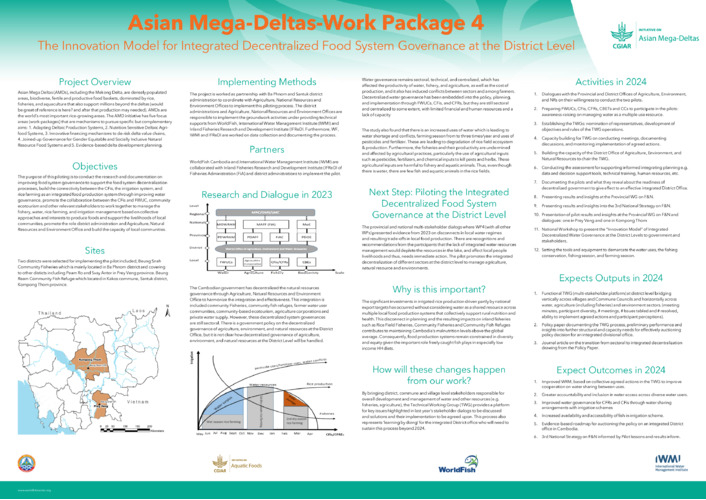The innovation model for integrated decentralized food system governance at the district level

Mak Sithirith, Sanjiv De Silva, Sao Sok, Heng Kong. (16/4/2024). The innovation model for integrated decentralized food system governance at the district level. Bayan Lepas, Malaysia: WorldFish (WF).
Asian Mega Deltas (AMD), including the Mekong Delta, are densely populated areas, biodiverse, fertile and productive food baskets, dominated by rice, fisheries, and aquaculture that also support millions beyond the deltas. Asian Mega Deltas are the world´s most important rice-growing areas. However, delta food systems are reaching a significant tipping point. The Asian Mega Deltas are likely to be hit by serious impacts of climate change, including more frequent and more intense floods, salinization, water shortages and climate extremes that will slow down economic growth, further erode food security, and trigger new poverty traps and emerging hotspots of hunger. The AMD Initiative has five focus areas of work packages (WP) that are mechanisms to pursue specific but complementary aims: 1. Adapting Deltaic Production Systems, 2. Nutrition-Sensitive Deltaic Agri-Food Systems, 3. Innovative Financing Mechanisms to De-risk Delta Value Chains, 4. Joined-up Governance for Gender Equitable and Socially Inclusive Natural Resource Food Systems and 5. Evidence-Based Delta Development Planning. Among of these five WPs, the AMD-WP4 is worked to implement the pilot on The Innovation Model for Integrated Decentralized Food System Governance at the District Level to conduct the research and documentation on improving food system governance to support the food system decentralization processes, build the connectivity between the community fisheries (CFis), community fish refuge (CFR), the irrigation system, and rice farming as an integrated food production system through improving water governance, promote the collaboration between the CFis, CFR and farmer water user communities (FWUC), community ecotourism and other relevant stakeholders to work together to manage the fishery, water, rice farming, and irrigation management based on collective approaches and interests to produce foods and support the livelihoods of local communities, promote the role district administration and Agriculture, Natural Resources and Environment Office and build the capacity of local communities.